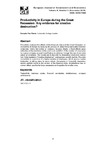Productivity in Europe during the Great Recession: Any evidence for creative destruction?

Ver/
Use este enlace para citar
http://hdl.handle.net/2183/23440Coleccións
Metadatos
Mostrar o rexistro completo do ítemTítulo
Productivity in Europe during the Great Recession: Any evidence for creative destruction?Autor(es)
Data
2016Cita bibliográfica
Paz Pardo, G. (2017). Productivity in Europe during the Great Recession: Any evidence for creative destruction?. European Journal of Government and Economics, 5(2), 82-103. https://doi.org/10.17979/ejge.2016.5.2.4318
Resumo
[Abstract] This article analyses the effects of the financial crisis and the Great Recession on productivity in Europe by studying the process of labour force reallocation between companies. Using micro-data on company balance sheets, a fixed-effects panel estimation of the predictors of the post-crisis evolution of the number of employees for a given company is used. Identification is achieved through the use of pre-crisis values of covariates. The results are in line with the theoretical predictions derived from Schumpeterian (“creative destruction”) endogenous growth models. Pre-crisis productivity is a predictor of a higher number of employees, which means creative destruction is taking place to some extent. Companies in financially dependent sectors perform worse in the context of the financial crisis. Indebtedness has an uneven effect: positive for large companies and negative for smaller ones.
Palabras chave
Productivity
Business cycles
Financial constraints
Indebtedness
Company performance
Business cycles
Financial constraints
Indebtedness
Company performance
Versión do editor
Dereitos
Atribución 4.0 España
ISSN
2254-7088






